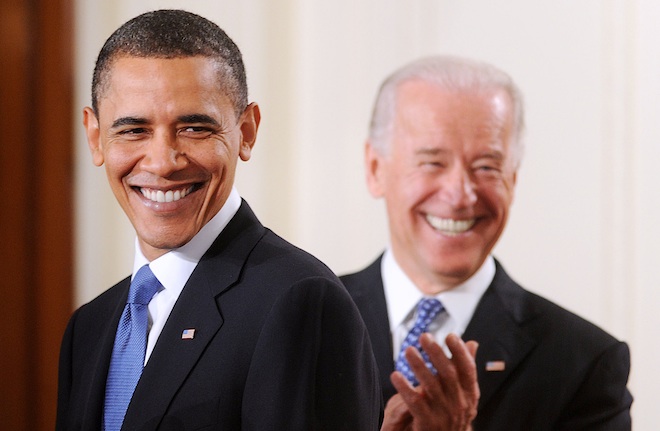President Obama signed the payroll tax cut package into law late Wednesday night, capping off a months-long saga that might prove to be Congress’s last major battle before the 2012 election. So just what does the final outcome mean for the various political players? Here’s how things broadly broke down.
President Obama is the obvious winner, having portrayed himself throughout the long fight as the champion of middle-class tax cuts and economic security for the long-term unemployed. The payroll battle, which played out alongside a gradually improving economy, helped bump up Obama’s approval ratings and gave him an important political weapon for re-election.
Senate Dems are going to have a tough time holding their majority in the November elections (they’re defending 23 seats while Republicans only need to defend 10 in mostly safe states), but being on the right side of public opinion in this fight helps draw a clear distinction with Senate GOPers who mostly opposed the package.
Middle class and out-of-work Americans will be better off this year as a result of this package; 160 million American workers will take home an average of $40 more per paycheck, and the long-term unemployed won’t see their benefits lapse as soon as they otherwise would.
Medicare doctors would hardly call this a win because they’ve spent the past year salivating at the prospect of a permanent “doc fix,” but this bill patches up their reimbursement rates through 2012, averting an automatic 27.4 percent cut.
House Republican leaders dodged a bullet with this deal after taking a pummeling back in December for holding up a payroll tax cut extension that even Senate Republicans signed off on. Conservatives are mad that they backed off their demand that the tax cut be paid for with spending cuts, but the House GOP avoided the more disastrous outcome of blocking a tax break for the middle class. They also managed to get some of their pet projects into the deal, such as health reform law cuts and drug testing language for welfare recipients.
Sen. Mitch McConnell, the Republican Minority Leader who badly wants to win back the Senate, lost a major talking point as his caucus ended up largely voting against a middle-class tax cut. McConnell was essentially snubbed by House Republicans who saw no way out of the deal, and he publicly complained that his negotiators were left on the sidelines as House Republicans cut a deal with Dems.
Maryland Dems like House Minority Whip Steny Hoyer and Sen. Ben Cardin have to explain to the many federal workers they represent why their party backed a deal that costs them in pensions. Both voted against the package for that reason.
Sen. Tom Harkin, the Iowa Democrat who championed the $15 billion Prevention and Public Health Fund in the Affordable Care Act, saw it chopped by $5 billion. Harkin was one of a handful of Senate Dems who voted against the deal.
Social Security‘s trust fund is projected to be solvent for several decades, and although the $94.5 billion stripped from it will be replenished by the Treasury, the precedent of looking to Social Security revenues as a vehicle for tax cuts may not bode well for it in the long run.
Welfare recipients who want to pull out some cash at a strip club are down on their luck: House Republicans inserted language seeking to ensure that welfare funds cannot be accessed at ATMs in strip clubs, liquor stores or casinos. How that will be implemented and how much it will cost is a separate question.










